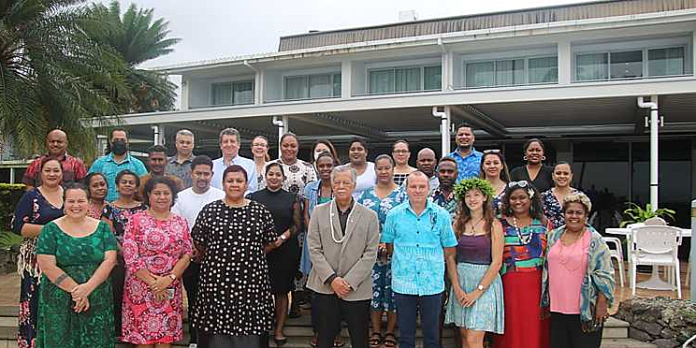By Matai’a Lanuola Tusani T – Ah Tong
The Pacific Islands Forum Secretary General, Henry Puna officially welcomed Pacific journalists on Sunday attending the Media Masterclass ahead of the 51st PIF Leaders’ Meeting in Fiji.
Held at the Holiday Inn hotel in Suva Fiji, the media were brief ahead of the public launch of the 2050 Strategy for the Blue Pacific which has been embargoed until after the official launch.
In opening the media training, Puna noted the first face to face summit for the leaders since 2019 and the first return to the forum at the PIF Secretariat for a long time.
“Pandemic disruptions and recovery alongside the ongoing challenges of the climate crisis, and the ongoing geostrategic and geopolitical priorities and interests in our region as well,” he said.
“Everywhere you look in the world headlines today, there is an increase in Pacific story and you are a key part of that story and how it frames our conversations and understanding of the world and our rightful place in it.
“May you continue to deliver milestone moments for our Pacific media, and for the diversity and representation we are celebrating today.”
The Media Masterclass at the 51st forum leaders is delivered by the Pacific Islands Forum, the Pacific Islands News Association (PINA), and the Pacific Media Assistance Scheme (PACMAS).
The Australian Ambassador and High Commissioner to Fiji, John Feakes welcomed the journalists at the Masterclass and had accompanied Puna.
The Secretary General acknowledged the importance of journalists reporting on regional issues to ensure communities are informed and engaged on the policies strengthening common regional future.
Collaboration and cooperation are as critical to resourcing the work that we do for the Pacific as it surely is for resourcing the work you do on reporting on regionalism, he added.
He recalled not long after the leaders met at the founding session in 1971 they quickly found out that communicating their vision and desire for regional unity required media partnerships.
In a world where media and communications itself has undergone a transformation, Puna said some values remain clear.
“The need for people to have access to information that is factual and fair will always be the cornerstone of our partnership with you.
“The conversations on development priorities for the Pacific and what these mean for our people must always be informed by the voices of our people.
“And the professional ethics and standards of your industry must be what sets you apart in a world where misinformation and fake news can have disastrous impact. Just ask President Trump.”
Furthermore, Puna said if there is one thing the Pacific leaders are good at it is talanoa, the ability to talk, to share ideas and passion, visions and dreams are often born from time spent in talanoa.
“But without a purpose, a plan and a strategy to test and carry ideas forward we would be wasting the same gifts which brought our seafaring ancestors to this sea of islands,” he said.
“Just as the stars have mapped the journeys that brought first canoes to our Blue Continent, the 2050 Strategy would be our North Star, guiding our journey to 2050 and beyond.
“Whether we speak of voices, of people, challenges and opportunities you should know that every story you are working on up to this point and onwards will resonate with this document.”
There were several speakers that includes members from the civil society that shared their views and objectives with the media during Sunday’s session.
The tentative programme for PIFL on Monday includes a meeting from the Pacific Group of the African Caribbean Pacific (PACP) Leaders and Blue Pacific Leaders Ocean Panel.
SOURCE: SAMOA OBSERVER/PACNEWS














